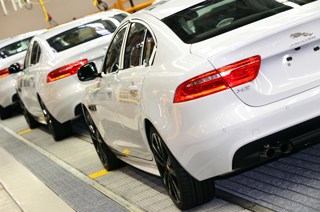In May and June, Fleet News surveyed all the major manufacturers to find out how they were responding to the coronavirus pandemic, how they are supporting their fleets customers and their views on the type of impact it would have on the fleet sector.
The resulting article was published in the June edition of Fleet News.
Here is Jaguar Land Rover UK's response.
Fleet News spoke to Andrew Jago, Jaguar Land Rover UK's general manager, fleet and business (answers as at 8/6/20)
How are you and your team staying operational in times of Covid-19?
Jaguar Land Rover fleet and business teams have operated from home since March, with customer and stakeholder meetings conducted via video conferencing.
What action are you taking to support fleets during the Covid-19 crisis?
Our retail network has fully reopened in England with social distancing and vehicle sanitising measures in place. In Wales, Scotland and Northern Ireland, half of our retailers are open for service and maintenance, with priority given to essential workers.
Our Customer Experience Centre and roadside assistance service continues to operate as normal.
Our demonstrator and press fleets were deployed to support emergency services and relief agencies, and we have delivered cars to essential workers throughout the crisis
When will your retail networks will start vehicle deliveries and collections?
Safe vehicle deliveries have started for all customers in England. In Scotland, Wales and Northern Ireland, deliveries are limited to essential workers and click and collect until restrictions are lifted.
Will Covid-19 have a bigger and longer lasting impact on our industry than the financial crisis in 2008?
From a demand perspective, it’s too early to say. Buyer behaviour and motivations are already changing through acceleration of online sales and the way business is conducted via home working and remote meetings.
At the same time, social distancing is likely to result in less commuters using public transport in favour of personal cars and taxis.
How much of a decline in total market fleet sales are you forecasting this year?
Before the crisis, the total passenger car market forecast was around 2.25 million units in 2020, with the latest outlook revised down to around 1.67 million units.
With fleet accounting for around half of the market, this indicates a reduction from around 1.13 million units pre-crisis to around 835,000 fleet passenger cars.
Please outline your exit strategy and how you believe the way business is carried out in future might change – the so-called ‘new normal’.
Our immediate priority is to fulfil customer orders that weren’t delivered while restrictions were in place. Furthermore, there is pent up demand to satisfy following confirmation of benefit-in-kind (BIK) rules for the next three tax years.
The budget statement from the Treasury on March 11 has provided clarity following a period of contract extensions while companies were waiting to assess the impact of any changes.
As restrictions are lifted, we are already experiencing high demand for Jaguar I-Pace and newly launched plug-in hybrid variants of our Range Rover Evoque and Discovery Sport, which offer an unrivalled combination of product appeal and class-leading Benefit in Kind taxation.
Conducting meetings remotely with our fleet customers is proving to be highly effective and will be the preferred method of contact for the foreseeable future.
How soon do you think fleet sales will recover after the coronavirus threat is over?
Recovery speed will vary by fleet sales channel. For example, a large proportion of rental demand is highly dependent on inbound visitors to the UK which is likely to take many months to recover to pre-crisis levels.
BIK changes will drive company car drivers towards battery electric and plug-in hybrid cars, where there is pent up demand to satisfy through the balance of 2020.
Access to funding will remain a key enabler for fleet customers; any changes to business underwriting criteria will inevitably affect the speed of recovery.
Will we experience a break on the development of MaaS and fleet electrification?
We are seeing increased interest and demand for flexible subscription services and anticipate this being a growth opportunity in 2020.
Fleet electrification continues to develop at pace, driven by product appeal, attractive BIK and salary sacrifice positioning, and demand from the public sector.























Login to comment
Comments
No comments have been made yet.